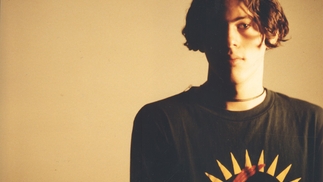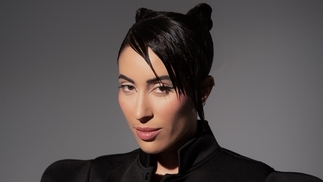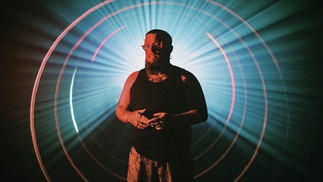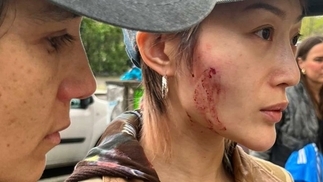Ellen Allien: DJ Mag cover feature
For long-serving Berlin techno queen Ellen Allien, a return to the physical — in both the way she plays and makes music — has re-energised her immensely.
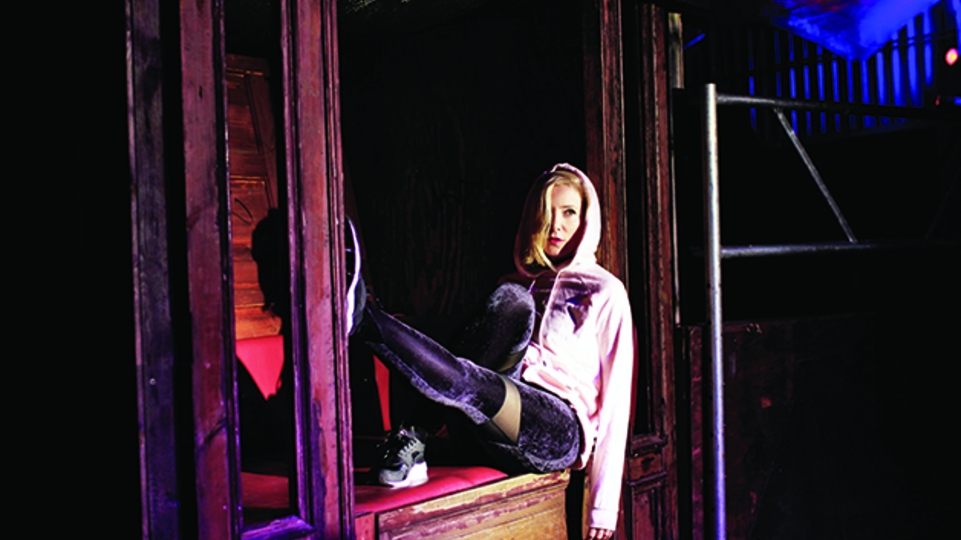
She's been playing gigs in record shops, buying and playing lots of vinyl, and made her new album, 'Nost', using mainly analogue equipment. Her seventh album is a real return to the dancefloor — deliberately so. It was created in her long-term home, Berlin — from where she runs her label, BPitch Control — although she now spends the summer months living in Ibiza. 'Nost' — taken from the term 'nostalgia' — is the sound of a DJ/producer still at the top of her game, as much in love with electronic music old and new as she's ever been. DJ Mag went to meet her in Berlin...
Words: Ben Murphy // Pics: Lisa Wassman
-------------
“I listen to techno records all the time,” says Berlin techno boss Ellen Allien. “Non-stop. I bring the disco into my home. I like the feeling of having a beat around.” For this DJ, producer, label owner and vocalist, the party doesn’t stop when she closes her front door. Electronic music is her way of life.
DJ Mag is in the centre of Berlin near where Ellen lives, and close to the offices of her pioneering BPitch Control label, to talk to the dance maven about her latest flurry of activity as a creator and DJ.
Since 1992, Ellen has been a leading light of the German capital’s club scene. She’s released seven albums, nearly 40 singles, and played sets around the world in practically every club worth caring about. In addition, her label BPitch has released classics by Moderat, Sascha Funke, Telefon Tel Aviv, Kiki and many more. While Ellen’s last album ‘LISm’ found her in full-on experimental mode, touching on neo-classical and abstract, beatless electronics, her new, eighth record ‘Nost’ is a love letter to the dancefloor and her life as a DJ.
On a rainy, cold afternoon at the end of winter, we wind through the muted yet culturally vibrant streets of Berlin-Mitte, and pass the imposing Fernsehturm television tower that’s come to signify the city. When we meet Ellen in a hotel lobby, she’s an immediately warm and charismatic presence. With her hair dyed blonde, dressed in cool, understated black hoodie and sports gear, in conversation she has an intensity and seriousness occasionally broken by laughter or wry humour. ‘Nost’ has got her fired up. As we discover, it represents a return to her techno roots and love of classic dance tracks. “Every track is a completely different aspect and genre of what I play. I wanted to make an album the way I play in clubs,” she says.
Of the nine tracks on ‘Nost’, eight are designed for club use. ‘Electric Eye’ is built from wriggling bass, big synth stabs and rolling ride cymbals, while ‘Physical’ is all distorted claps and sinuous arpeggios. ‘Stormy Memories’, the album’s centrepiece, is a powerful shift from melancholy synth and electronics into 4/4 acid bliss — and back again. It’s got a classic acid house feel, clearly influenced by the 1990s favourites Ellen’s recently returned to.
“I wanted to do one track of the music I really love, electronic sounds which are danceable,” she says. “That kind of music is my favourite. I wanted a very emotional beginning without beats, and the end had to be as beautiful as the beginning. In the middle, it had to be dance music so I could play it. It’s romantic electronic dance, I would say!”
Other tracks like ‘Jack My Ass’, by contrast, aim straight for the posterior. With its tough beat, acid bass and bleeps — plus Ellen’s vocal samples — it’s made for peak-time. “It’s a fun techno track, a groove bomb. It’s a body journey, communicating to the body with the bass,” Ellen says.
ANALOGUE
Ellen eschewed software during the making of ‘Nost’, instead favouring some newly installed analogue equipment that made her create in a novel way. Rather than being stuck in front of a computer, she could try out ideas, record the best bits and then turn them into tracks with a living vitality.
“I bought a Moog, it’s like a wall!” she marvels at the synth’s hulking dimensions. “Everything came out of this. It’s a completely different dynamic. In every software plug-in, some sounds are amazing, but the rest are not so good. With analogue, everything is good. It’s physical, it’s very beautiful when you touch it, and you see the lamps blinking. I work a lot on the computer, so it’s nice to move around the studio instead. It feels less like work and more like a jam session. I record the tracks longer live, and then cut out the best notes. You have the feeling that your hands are making the sounds. This makes it very creative.”
This return to analogue is played out in other ways on ‘Nost’. The album embodies Ellen’s nostalgia for the timeless tracks that have become an important part of her sets again. She’s begun looking back as well as forward, and rediscovering her love of vinyl has been a key part of this reminiscence.
“That’s why I called it ‘Nost’. For two or three years, I’ve played classics in my sets,” she says. “I started playing vinyl again two years ago, ’cause I could only buy some tracks on vinyl. I started going back into record stores, and I really enjoyed the feeling. In the past when I played a new track I would get goosebumps and felt, 'Wow'. Now it’s really if I play a classic, I feel something, not with new stuff. Because it reflects all of my history, all my DJ career.”
Records have been a big part of Ellen’s life since she worked in Berlin’s Delirium record shop in the early ’90s. Though she loved the ease of digital downloads to start with, lately she’s found that a lot of the best tunes, old and new, can only be found on wax. “First I was so happy to not be going in record shops anymore, discovering the internet; everything I could buy from Boomkat, Bleep, Beatport or iTunes. I enjoyed the feeling of everything being available. Even if it was an old school track, I could get it — it might be low quality, but I could find it. But then after a while, I found many labels just had 300 copies pressed to vinyl and they were finished, sold, so I started going back in the record store.”

It’s this return to record shopping in the flesh that has been the springboard for a new DJing concept: Vinylism. Inspired by the atmosphere and social interaction of crate-digging, Vinylism has seen Ellen drop into some of the world’s best record shops to spin tunes for two hours. So far, she’s played in Discos Paradiso in Barcelona, Ultrasuoni in Rome, Gravity Records in Turin, Smallville Records in Paris, La fin du Vinyle in Montreal, Serendeepity in Milan and Clone Records in Rotterdam, with more to come. But the kernel of the idea was planted in Iceland.
“I started Vinylism a year ago at Lucky Records, Reykjavik,” she says. “I played Sonar there, and then I said to Mirko [who works at BPitch], ‘Check out Reykjavik to see if there’s a record store, ’cause I want to meet people there’. They had great selections from old school ’90s techno, to rave stuff, everything. I did some research, checked the store, and said, ‘Perfect, let’s go’. So I did it there, and it was so amazing, so many people came.
“The next time was Barcelona, Discos Paradiso — it was super. They have a lot of old stuff and new stuff. I found a lot of ’90s records I had, but which were broken, so I could buy them again. One shop I played in Montreal, it was just old records, but so huge and so beautiful, every corner full of old pictures, mirrors. It was like a flat. All these ravers came, and the owner was so happy. Like, ‘This is so cool, you brought the young people here’. This guy was an old distributor of BPitch, and he’s running this record shop. So there are connections coming back.”
RECORD SHOPS
Part of the appeal of these emporiums is that beyond being just record outlets, they are also creative hubs, repositories for ideas. “There’s a lot going on in these record shops, not just the records. I did it in Milan at Serendeepity, and these guys are amazing, in the cellar they have second-hand clothes, all kinds of electronic music, everything, and they built their own effects unit for DJing.”
Ask Ellen what her favourite record shops are and she doesn’t miss a beat. “Hard Wax [Berlin]. It’s a really cool selection. Then Clone [Rotterdam]. Serge the owner is an amazing DJ, he plays complete body music. Kicks you in your arse. It’s so groovy. Spacehall is a very good record store in Berlin. One part is independent music, with an amazing selection. Also they have old rock records, which are not easy to find. The techno selection is also amazing. You can find something you can’t find in the other shops. The owner is a freak.
“In London, I really like Phonica, the selection is really great,” she continues, “every time I go there I find a lot of records. In New York, Output is cool. It opened as a club also, I really like the concept, they have a good selection of old stuff which is hard to find.”
Ellen doesn’t know how long the Vinylism concept will last. With some sorrow, she points out that the number of shops in existence has dwindled significantly. “I was thinking, when I’ve done all the record stores, what will I do after?” she reflects. “I don’t know. We don’t have so many left. I was a little bit sad when I thought of it.”

Club gigs naturally remain Ellen’s primary stock in trade. She’s busier than ever, last year racking up 140 shows. One of her best shows recently was at the newly revived Fabric. “I had my best gig at Fabric, ever. Because the people that came flipped out. I thought, when it opened again, it could be tricky. But there was extreme energy, I’ve never seen energy at Fabric like that ever. It’s because the crowd were celebrating. That’s great.”
With a residency at Circoloco at DC10 in Ibiza, Ellen now spends half the year on the island — something she never thought she’d do. In the past, she was unsure about dance culture there, but now she thoroughly enjoys the atmosphere of DC10, and also checking out other kinds of DJ sets she might not otherwise be exposed to.
“For five years I’ve been playing in Ibiza, which has been new for me,” she admits. “I never thought it could be a place for me, ’cause I didn’t like the music at all in the past. But at DC10 there are many cool DJs playing. The energy when people arrive there, it’s crazy. It’s really good, because I’m out of Berlin. I meet different people, and listen to many different DJ sets. It’s interesting to hear what they do. I analyse, analyse, analyse. I want to see what they do, what is the emotion? I love to work with different people, I like to be with different kinds of personalities.”
She also loves the sense of freedom she gets from going to the beach and sitting in the sunshine, a sensation she’d be unable to feel back home. “Many times I go to the sea and I feel so free and happy,” she tells DJ Mag. “I don’t need anything, not even an ice cream. I watch the sea and I feel complete, I swim in the sea, and I feel nature. I could live on the beach without anything. Nature for me is a very free spirit. It’s a different way of living and feeling.”
In the end though, Berlin is where Ellen feels most creatively energised. It’s the place she feels a connection. “For the months that I am here, I want to create. The city gives me peace. It’s quiet on the streets, you can pay for everything, you can eat cheaply. Street life is amazing here and I’m only creative here. In Ibiza I can’t create, I’m completely isolated.”
EXPERIMENT
Ellen Fraatz (her real surname) was born in West Berlin and discovered electronic music as a teenager. At a youth club disco, sandwiched between Michael Jackson and a hit from the Neue Deutsche Welle (German new wave), she heard a song that pricked up her ears and alerted her to the possibilities of synthesised sound. “An old track from Kraftwerk came on, ‘The Model’. I never heard this song in my life before. I danced, I moved. I could understand the lyrics, and they were very beautiful and very strange. This opened my brain, everything changed after I listened to this. It was minimalistic, mysterious but groovy, and full of effects. This was the music I felt 100%.”
After a spell in London in 1989, when she heard house music for the first time at The Wag, she returned to Berlin, and after meeting Dimitri Hegemann, founder of legendary Berlin club Tresor, she got a residency there in 1992, as well as the clubs E-Werk and The Bunker. Working in the record shop Delirium and DJing on the city’s Kiss FM station, Ellen cultivated her own signature style.
A mix of German electronics and techno, UK acid and IDM with an experimental tenor, Ellen’s tastes manifested in the Braincandy label, and later in 1999, BPitch Control. Into the early 2000s, Berlin became an increasingly fertile environment for inspiring electronic music, which allowed Ellen to experiment with fusing different styles. “I had a period where I played new school electro, Warp stuff, very abstract, like Kid 606. I started mixing up a lot of electro with old school techno. It was maybe 2001,” she recalls.
That same year she released her debut album ‘Stadtkind’, an impressive set of electro, techno and synth manipulations. On her next few records, from 2003’s ‘Berlinette’, with its glitch-pop vocal cut-ups and melodic sounds to 2005’s excellent ‘Thrills’, she pursued a singular course between underground credibility and accessible melody, while her DJ sets ventured into more conceptual territory.
“In 2006 I became very abstract and did parties at WMF [reputed, now-closed Berlin club]. De:bug had a residency there, one of the best magazines from Berlin. There was electronic dance, house, mixed-up stuff. I invited Andrea Parker to play. It was amazing — a really good period for new music, something fresh. A lot of stuff came from the UK, but also Germany. Then I was going a little bit too far with the sound. A friend said to me, ‘If you go more abstract Ellen, I don’t know if people will still listen to you’. When you start going into stuff like Autechre beat structures, it’s all amazing stuff, or like Shackleton, it’s amazing what he’s doing. But if it’s not danceable, it’s not so interesting any more, if you like to dance. So when I was going too far, I stopped it.”
Before she did rein it in, one of Ellen’s best and most out-there projects was 2006’s ‘Orchestra Of Bubbles’, an album made in collaboration with Apparat. A superb set of armchair techno, electro and IDM, it’s among the best electronic records of that decade.
Ellen Allien was one of the first women DJ/producers to break through in the Berlin scene. When she started out, though many women had revolutionised electronic music in the spheres of ambient, pop and experimental composition, there were few scene leaders in house and techno. Today it’s a considerably different picture, with many women DJs, producers and label owners making a mark. Still, the industry remains male-dominated. To highlight this fact, and to big up her female contemporaries, she hosted a We Are Not Alone night at last year’s Amsterdam Dance Event (ADE), inviting some of her favourite women DJs to play.
“We had Magda, Cassy, Johanna Schneider from Bossmusik, and me, for a female We Are Not Alone party,” she says. “Johanna played vinyl-only, and it was amazing. Technically and the way she performs, it was great. That’s maybe why I wanted to start playing vinyl again — because I wanted all Bossmusik records on vinyl! Cassy, I like her when she plays house music with vocals. It’s not the music I would play, but the way she’s doing it is cool.”
Ellen mentions Margaret Dygas, Miss Kittin, Steffi, Andrea Parker and Nina Kraviz as other women DJs she rates. She’s also effusive in her praise for some of electronic music’s greatest female mavericks. “What Laurie Anderson did with the voice was amazing. Björk influenced me a lot, playing with the voice. It’s outstanding. She’s better live than on the records. You have to see her live. I cry when I listen to her. Her voice carries so much emotion, her way of pronouncing the words. Kate Bush, her abstract dances. I adore Kyoka, she is from Japan but moved to Berlin. She makes electronica on Raster-Noton, and I play some stuff in my sets ’cause it’s really danceable.”
Coming up, Ellen is bringing her We Are Not Alone party to OffWeek in Barcelona (at the same time as Sonar), with Dasha Rush, Kobosil and Silvie Loto. The continued guiding principle is a love of DJing and her passion for music. In all her different activities, it’s this passion that shines through. When she talks about a particularly good set at Movement festival in Detroit, her eyes shine at the memory.
“I played an awesome set, but the music was not about how I mixed it, how perfect it was, more the history, you know?” she says. “It was the right place to do it. The dancefloor became more full as people understood there was something going on, that the DJ was expressing herself totally. With passion. It was a celebration of the music, of the tracks I play.”
* 'Nost' is out on 12th May on Bpitch Control.
